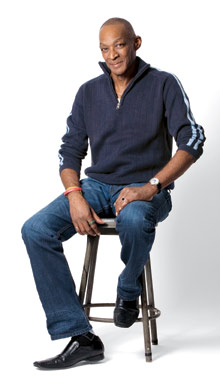For Wayne Starks, 51, a former New York City bus driver, overcoming addiction and staying sober have been central to his fight to be healthy while living with both HIV and hepatitis C virus (HCV). “I wouldn’t have survived if I had kept using drugs and alcohol,” Starks says.
 When he was diagnosed with HIV in 1986, though, his doctors didn’t think Starks, who has two children, would live long. That grim outlook made curbing his addictions harder.
When he was diagnosed with HIV in 1986, though, his doctors didn’t think Starks, who has two children, would live long. That grim outlook made curbing his addictions harder.
Starks started HIV meds in the early 1990s but returned to using drugs and drink on and off for over a decade, grabbing the quick fix to temporarily forget his problems in times of tragedy. Then in 2000, when Starks learned he also had hep C, he committed to sobriety.
Today, as a board member for VOCAL-NY (formerly New York City AIDS Housing Network), a group advocating for the rights of HIV-positive people, Starks draws on his years of living on the streets and in HIV/AIDS Services Administration (HASA) housing. “I know what it is to be homeless,” Starks says.
Where you live can influence your health for better or worse, and drug-free housing is definitely for better. After cycling through several drug-infested housing complexes—smoky hallways in one gave him asthma attacks—Starks has found permanent scatter-site housing that helps him put his health first, take his HIV meds on time, make doctor’s appointments and get enough rest.
Starks wasn’t surprised to learn he had hepatitis C—several of his friends had it too. He points out the danger of so many HCV cases remaining undiagnosed: “People are living with hep C for years and don’t even know they have it. They’re drinking and using drugs. Little do they know it’s eating up their liver slowly but surely.” You can’t make informed decisions about your health, Starks says, without a full picture of your diagnosis—especially when considering giving up alcohol.
People also tend to make bad decisions if they’re told their outlook is hopeless, so Starks works to spread optimism and encouragement. “If you have HIV, if you have hep C, there’s treatment out there for you,” Starks tells people in his work for VOCAL. An HIV or HCV diagnosis is not a condemnation, he says, but a chance for a better, healthier way of life.
HCV regimens don’t work well in African Americans with genotype 1 HCV—a situation that applies to Starks—so he put off considering treatment. But in 2006 his doctor told him his liver enzymes were high, and Starks gathered the courage for a liver biopsy. Instead of another grim medical assessment, he was told his liver was stable. This allowed him to postpone HCV treatment for at least another five years, when drugs with greater success rates in black patients might be available. Anticipating his next appointment with the specialist, Starks says he’s comforted that some such drugs recently arrived, with others on their way.
Meanwhile, with the support of his family and a 12-step program, Starks is now 11 years sober and enjoying his role as a father and grandfather. He eats nutritious meals, drinks lots of water and has checkups with his primary care doctor every two to three months. His HIV viral load is undetectable, but his advocacy by example can be detected—loud, clear and courageous.
To read more of Wayne Starks’ story, click here.


Overcoming Adversity
For Wayne Starks, a former New York City bus driver, overcoming addiction and staying sober have been central to his fight to be healthy.






Comments
Comments